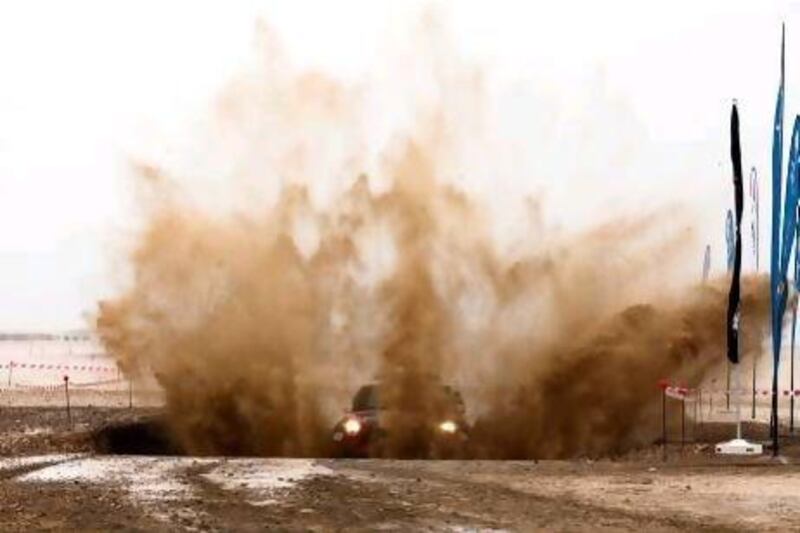DUBAI // Race stewards at this year's Abu Dhabi Desert Challenge will be used as lab rats by researchers studying the effects of hydration in the desert.
From Sunday, 50 marshals will be exposed to the intense heat for up to 12 hours at a time for five days.
Their role is to ensure the 150 competitors cross the start line on time and pass the proper checkpoints across the Empty Quarter before reaching the bivouac camp every evening.
Heading the study is Dr Sean Petherbridge,chief medical officer at the Automobile Touring Club UAE (ATCUAE).
He said the findings would help not only motorsport, but all activities that have marshals working in high temperatures.
"We have a unique environment to study heat and hydration exposures," said Dr Petherbridge. "The data gathered from people who have to work in this environment will be beneficial to all sports."
Studies have been conducted on the effect of heat on drivers but not the men and women working at the events.
Mohammed ben Sulayem, the ATCUAE president, said: "Working in extreme heat is extremely challenging. As much as the safety of our volunteers and teams is our number one priority, we have many people of different walks of life having to endure these conditions year-round."
The study will monitor the 50 marshals in groups. At the end of each day, they will give urine and blood samples, which will be analysed by the Motorsport Knowledge Institute in conjunction with the University of Ulster in Northern Ireland.
The organisations have partnered to carry out the research.
Dr Gareth Davison, from the University of Ulster, is an expert on dehydration and said people working in hot and humid environments were obviously more susceptible.
"Dehydration affects physical and mental capability and the ability to perform at a high level," he said. "A decrease of water level or increase in sweat can cause high blood pressure and low sodium levels in the blood.
"That is very dangerous as it can lead an individual to collapse, or even worse outcomes."
The study will measure the marshals' blood pressure and pulses.
A blood sample will be tested for sodium levels, while urine will be analysed for hydration levels.
"The results will be useful for us to know what levels of [fluid] replacements the marshals need," said Dr Petherbridge.
Results from this year's race will make up the first of three studies.
Marshals at the Abu Dhabi Formula One Grand Prix will be the focus of a second study. A number of marshals at the event have suffered adversely from November's moderately high temperatures of about 30°C.
The third study will be conducted on participants at the longest-running rally in the region, the Dubai International Rally at the end of November.
The results of the studies will be published at the end of the year.
"This is to set guidelines as to the best practice to look after our marshals properly," said Dr Petherbridge.
Andrew Childs, chief marshal for the Desert Challenge, said the heat had a major effect, even on those in the shade.
"At the Formula One, we lost a lot of marshals due to the heat - about 25 to 30 a day had to be taken off their post and treated before they were put back on," he said.
Unlike the grand prix drivers, marshals are on the track for three to four races under the punishing sun.
Generally, temperatures in the desert are two to three degrees higher than on the coast.
Last year, because of high winds and sandstorms, marshals at the Desert Challenge had to work without shade because awnings would have blown away, said Mr Childs.
"Marshals are responsible for boxes of water and they pass them to the competitors," he added. "There are no instructions to drink and if left to their own devices, they will probably not drink the right amount."






